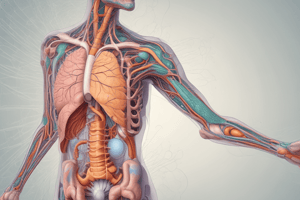Podcast
Questions and Answers
What is the enzyme responsible for breaking down carbohydrates in the mouth?
What is the enzyme responsible for breaking down carbohydrates in the mouth?
- Pancreatic lipase
- Salivary amylase (correct)
- Pepsin
- Lingual lipase
Which phase of swallowing is considered voluntary?
Which phase of swallowing is considered voluntary?
- Gastric Phase
- Pharyngeal Phase
- Buccal Phase (correct)
- Esophageal Phase
Which neurotransmitter stimulates the secretion of thin, enzyme-rich saliva from the salivary glands?
Which neurotransmitter stimulates the secretion of thin, enzyme-rich saliva from the salivary glands?
- Dopamine
- Serotonin
- Acetylcholine (correct)
- Epinephrine
Where does absorption primarily occur within the digestive system?
Where does absorption primarily occur within the digestive system?
Which of the following is NOT an accessory organ of the digestive system?
Which of the following is NOT an accessory organ of the digestive system?
What type of contractions are responsible for mixing food in the digestive tract?
What type of contractions are responsible for mixing food in the digestive tract?
Which phase of swallowing is mediated by signals to the swallowing center in the medulla?
Which phase of swallowing is mediated by signals to the swallowing center in the medulla?
Which enzyme in the mouth is responsible for breaking down triglycerides into fatty acids and monoglycerides?
Which enzyme in the mouth is responsible for breaking down triglycerides into fatty acids and monoglycerides?
Which type of saliva is stimulated by the sympathetic nervous system?
Which type of saliva is stimulated by the sympathetic nervous system?
What is the primary function of lingual lipase in digestion?
What is the primary function of lingual lipase in digestion?
Study Notes
Digestion Overview
- Digestion involves 4 basic processes: digestion, absorption, motility, and secretion
- Involves the digestive tract (mouth to anus) and accessory organs (e.g., teeth, tongue, salivary glands, liver, gallbladder, pancreas)
Gastric Motility and Secretion
- Slowed down by CCK (released due to presence of fatty acids and amino acids) and enterogastric reflex (triggered by amino acids/peptides, acid, duodenal stretch, and hypertonicity)
- Gastric secretion is regulated by:
- Gastrin: stimulates acid and gastric enzyme secretion
- Secretin: released due to acid, stimulates alkaline fluid secretion and reduces gastric secretion
- CCK: released due to amino acids and fatty acids, stimulates pancreatic enzyme secretion, gallbladder contraction, and reduces gastric motility and secretion
Hormone Summary
- Gastrin: stimulates acid and gastric enzyme secretion
- Secretin: stimulates alkaline fluid secretion and reduces gastric secretion
- CCK: stimulates pancreatic enzyme secretion, gallbladder contraction, and reduces gastric motility and secretion
Large Intestine Motility
- Haustral contractions: slow and weak, allowing mixing and absorption of salts and water
- Mass movements: powerful waves of contractions triggered by food in the stomach, moving fecal mass to the rectum
- Rectal (defecation) reflex: stimulated by feces in the rectum, involving the sacral segment of the spinal cord and smooth muscle contractions
Micelle Formation
- Micelle: formed by bile salts and phospholipids, with a hydrophobic interior and hydrophilic exterior
- Emulsification of lipid globules, lipase, and fatty acids + monoglycerides
- Micelle diffuse into enterocyte, where fatty acids + monoglycerides are absorbed
Gastric Motility/Secretion Regulatory Phases
- Cephalic phase: prepares stomach for food, triggered by thought, sight, smell, and taste of food, stimulating enzymes and acid secretion
- Gastric phase: food buffers pH, which slowly decreases, reaching 3 when the stomach is nearly empty, shutting down acid and enzyme secretion
- Intestinal phase: regulates rate of chyme entry into duodenum, controlling acid neutralization, tonicity, and digestion and absorption in the small intestine
Studying That Suits You
Use AI to generate personalized quizzes and flashcards to suit your learning preferences.
Description
This quiz covers the regulation of gastric motility and secretion through hormones like CCK, Secretin, and Gastrin. Understand how factors like the presence of food, amino acids, peptides, and duodenal stretch affect the digestive processes in the stomach and duodenum.




